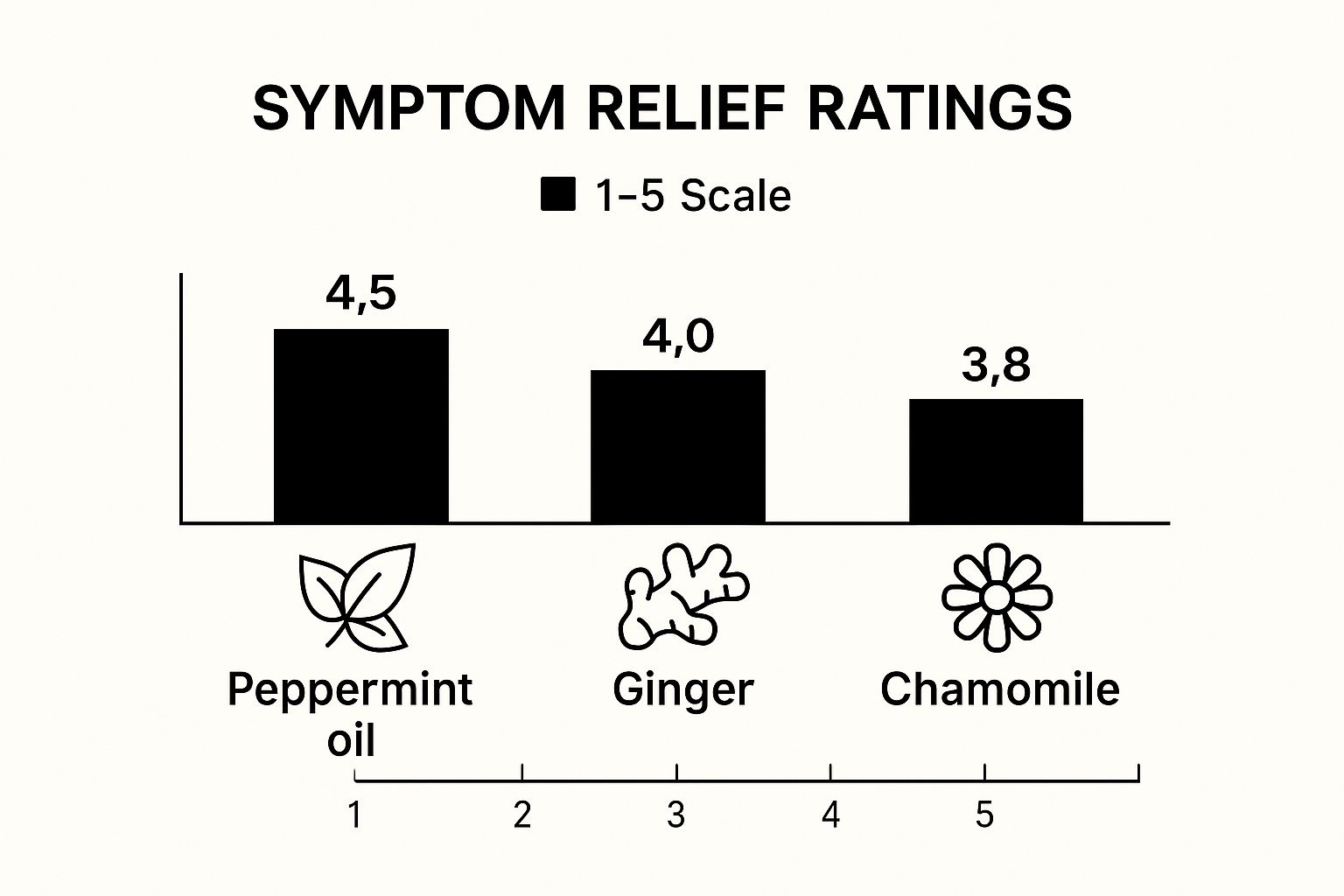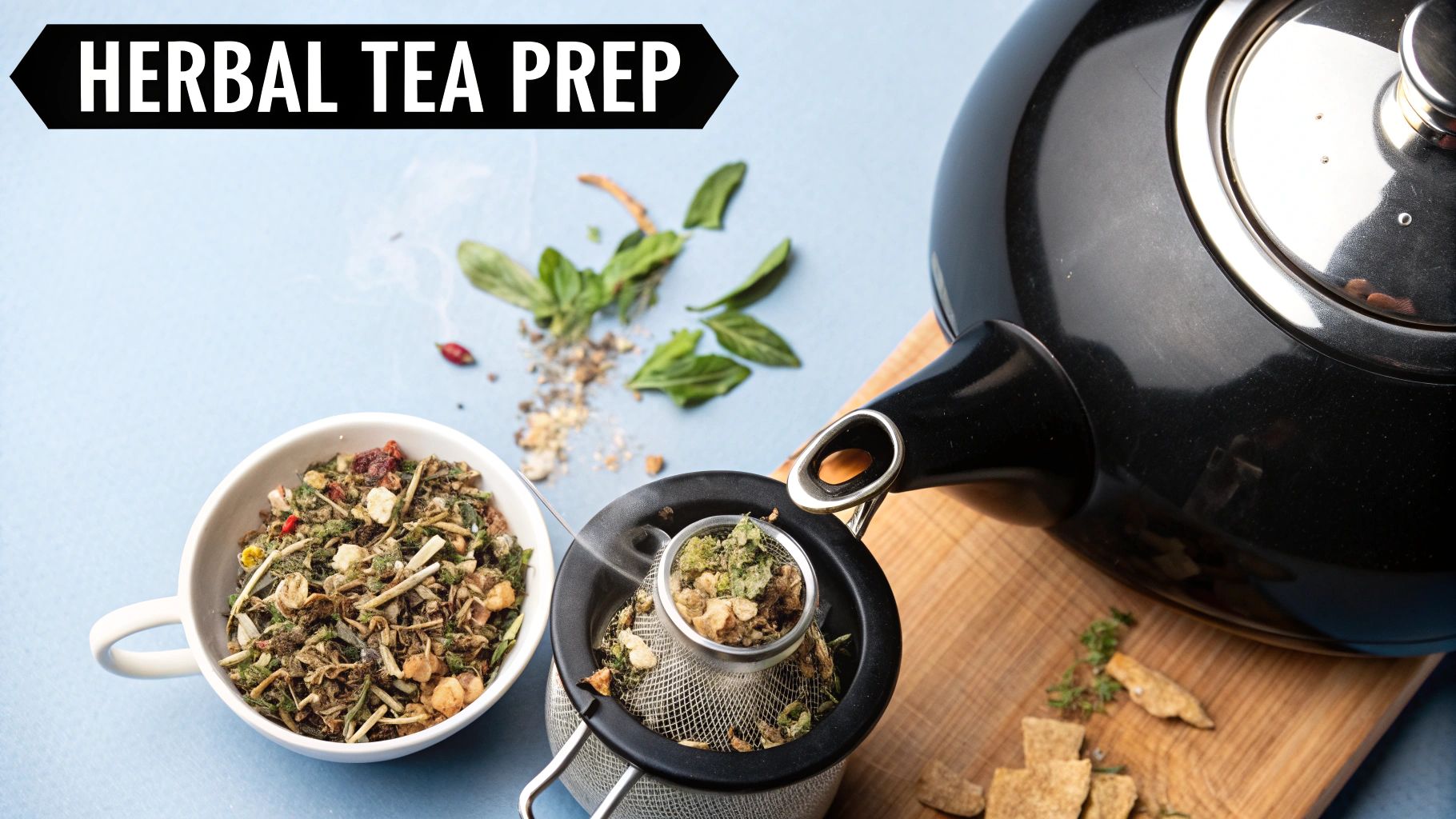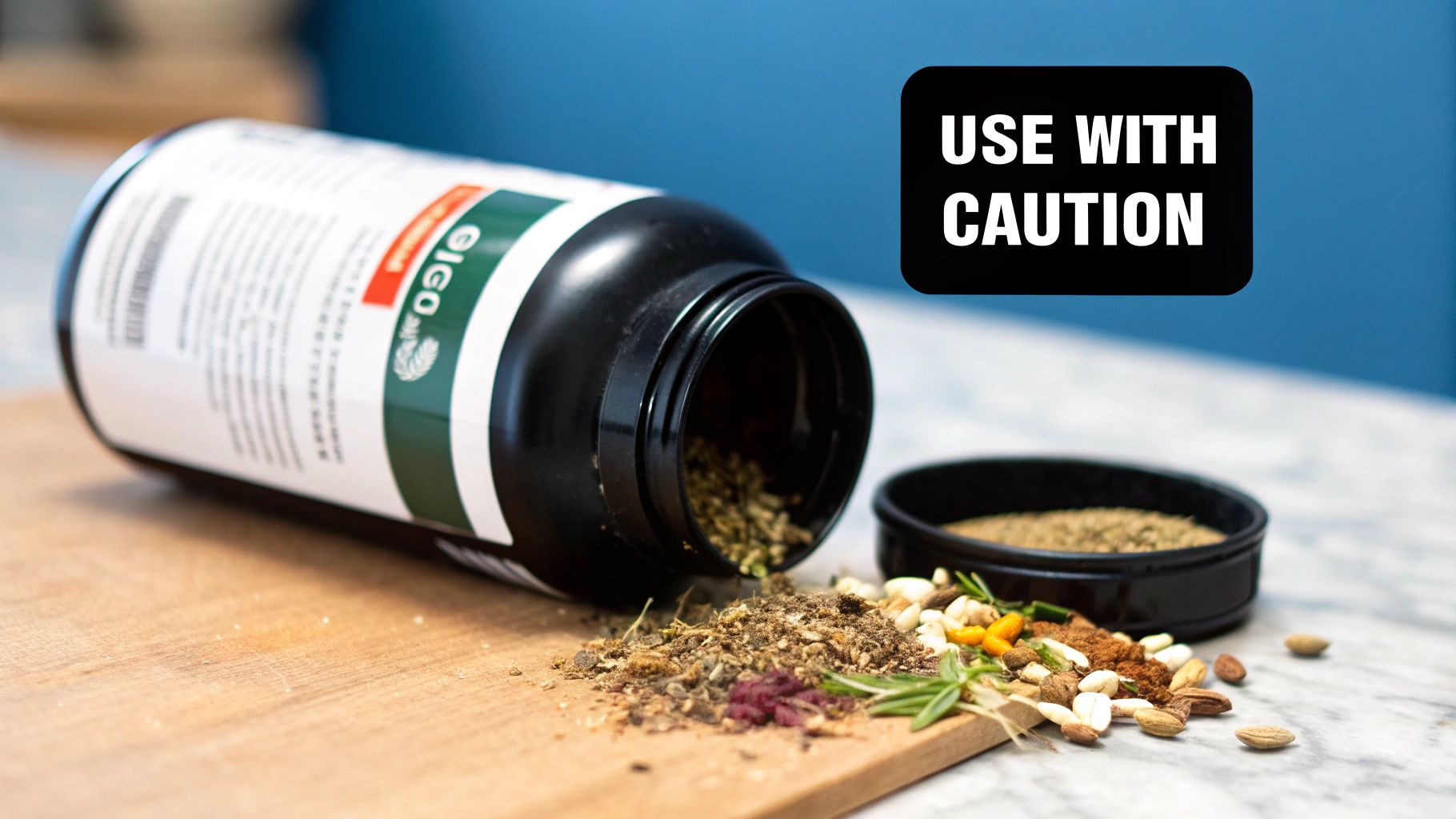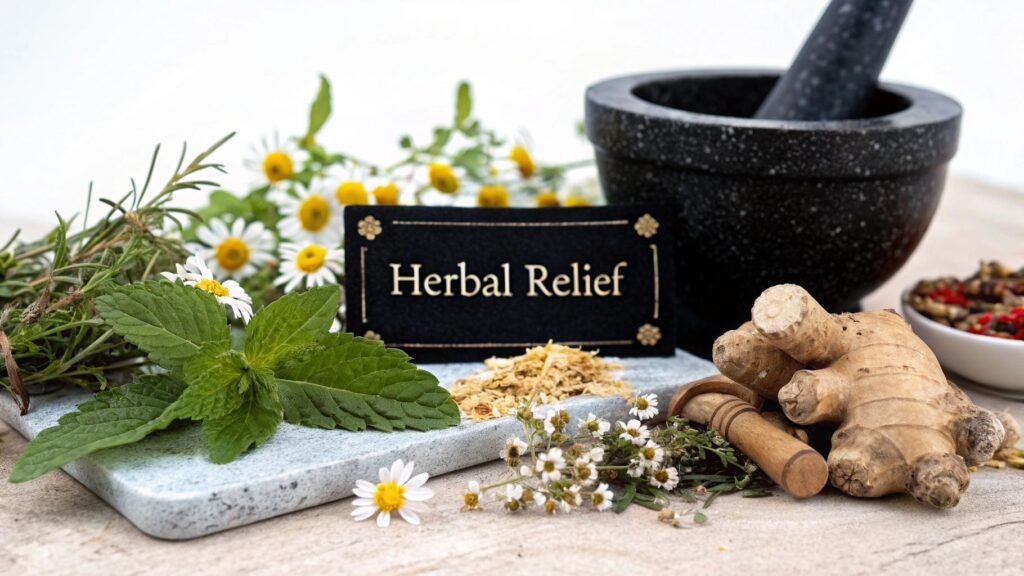If you're dealing with the daily ups and downs of Irritable Bowel Syndrome (IBS), you know it’s more than just a bit of stomach trouble. It can completely disrupt your life. For so many people I see, herbal remedies for ibs are becoming a trusted, science-supported way to manage the bloating, cramping, and digestive chaos, offering a gentler path to long-term relief.
Why People With IBS Are Turning to Herbal Remedies
Living with IBS often feels like you're constantly planning your life around your gut. It's not just the physical pain; it's the endless worry about where the nearest bathroom is, the anxiety that comes with eating out, and the sheer frustration of feeling like you've lost control over your own body. This is a daily battle for a huge number of people.
With IBS affecting an estimated 5% to 10% of the global population, it’s no surprise that people are searching for better ways to cope. While conventional medications are often the first stop, we're seeing a massive increase in people exploring natural products and herbal extracts. You can see just how significant this trend is in the full irritable bowel syndrome treatment market analysis.
Getting Back to Nature for Gut Health
For thousands of years, long before modern medicine, cultures all over the world used plants to support digestive health. What’s exciting is that modern science is now starting to confirm what traditional wisdom has known all along. This rich history is a big reason why many people feel comfortable turning to botanicals as an alternative.
The draw for many is the potential for fewer side effects and a gentler effect on the body compared to some pharmaceuticals. It's all part of a larger movement toward taking an active role in your own health and finding solutions that feel right for you. For many, adding herbs to their routine is a powerful step in that direction.
Herbal remedies are more than just a way to quiet symptoms. They represent a partnership with your own body, using nature’s pharmacy to help restore balance and reclaim your quality of life.
What the Herbal Approach Really Means
Unlike a single pill designed for everyone, using herbal remedies for ibs is about figuring out which plants work best for your specific symptoms. It’s a much more personalized strategy, which is a cornerstone of many traditional healing practices.
When you start to learn about the benefits of traditional Chinese medicine, for instance, you see a philosophy that treats the body as a whole, interconnected system. The goal isn't just to silence a symptom; it's to get to the root cause of the imbalance and gently guide the body back to health.
How Herbs Calm an Irritated Gut

To really grasp how herbal remedies can help with IBS, it helps to picture your gut as a sensitive, intricate ecosystem. When IBS flares up, it’s like this ecosystem gets thrown completely out of whack. Botanicals work like skilled gardeners, each bringing a specific tool to gently coax the system back into balance without causing more disruption.
They do more than just put a band-aid on the symptoms. Instead, they get to the root of the problem, addressing the underlying dysfunctions that cause all the trouble. This is why herbs can be so effective; they offer a range of actions that can be tailored to what you’re actually experiencing, rather than a one-size-fits-all approach.
Unpacking the Primary Actions of Gut-Soothing Herbs
Let's break down the main ways these natural remedies offer relief. Each one targets a common IBS complaint, giving us a clearer picture of how they help you feel better.
-
Antispasmodic Action: This is a big one for IBS. When you’re having a flare-up, your intestinal muscles get tense and start to twitch, leading to those all-too-familiar cramps. Antispasmodic herbs essentially tell these muscles to relax, easing the spasms and the pain that comes with them.
-
Carminative Effect: This is all about tackling gas and bloating. Carminative herbs help your digestive system release trapped gas, which eases that tight, pressurized feeling in your abdomen. They help prevent the gas from building up in the first place, offering relief before the discomfort really sets in.
-
Anti-inflammatory Properties: We now know that low-grade, chronic inflammation in the gut lining is a major factor for many people with IBS. Certain herbs contain natural compounds that act like a soothing balm on this irritation, helping to calm things down and foster a healthier, less reactive gut.
These actions don’t work in isolation. They often work together, creating a synergy that leads to a more stable and comfortable digestive system.
The real strength of herbal medicine lies in its ability to offer nuanced solutions. It's not about forcing a reaction but about gently guiding the body's own systems back toward a state of natural balance and function.
Supporting the Gut-Brain Connection
You can't really talk about IBS without bringing up the gut-brain axis. This is the constant, two-way communication superhighway between your digestive tract and your brain. We’ve all felt it—stress and anxiety can directly trigger or worsen gut symptoms, and a distressed gut can send signals that make you feel more anxious. It’s a vicious cycle.
This is where another important class of herbs, known as nervines, comes into play. Nervines are plants that specifically help soothe and support the nervous system. When we use them for IBS, they can help quiet the frantic stress signals traveling from the brain down to the gut. By calming that "nervous stomach," they help break the cycle of anxiety-fueled spasms and discomfort.
Understanding these mechanisms is the first step in choosing the right herbal remedies for ibs based on what your body is actually telling you it needs.
The Top 5 Evidence-Backed Herbs for IBS
When you're trying to manage IBS, the world of herbal remedies can feel like a maze. The good news is that a handful of botanicals have truly stood the test of time—and scientific scrutiny. These aren't just old folk remedies; they're plants with powerful compounds that target specific IBS symptoms like cramping, bloating, and that all-too-familiar gut inflammation.
Let's break down the five herbs that have the most compelling evidence behind them, offering a reliable, natural way to support a happier gut.
1. Peppermint Oil: The Antispasmodic Powerhouse
If there's one herb that's become a go-to for IBS, it's peppermint oil. Its effectiveness comes down to its active compound, menthol. Think of menthol as a natural muscle relaxer specifically for your gut. It directly targets the smooth muscles lining your intestinal walls, calming the painful spasms and cramps that are a hallmark of an IBS flare-up.
This is why enteric-coated peppermint oil capsules are so popular—they deliver the menthol right where it's needed most. By relaxing those overactive muscles, it provides targeted relief from abdominal pain. It’s no surprise that while traditional antispasmodic drugs held about 22.6% of the market in 2025, the demand for clinically validated dietary supplements like peppermint oil has been soaring.
2. Ginger: The Prokinetic and Anti-Inflammatory Root
Ginger has been a trusted digestive aid for centuries, and for good reason. For those with IBS, it offers a fantastic two-pronged attack. First, it’s a natural prokinetic, which is just a fancy way of saying it helps get your digestive system moving. This gentle nudge makes it incredibly useful for anyone dealing with the sluggishness and bloating of IBS-C (constipation-predominant).
Second, ginger is packed with potent anti-inflammatory compounds called gingerols. These active ingredients go to work soothing the low-grade inflammation in the gut lining that often fuels IBS symptoms. Whether you prefer it as a comforting tea or in a convenient capsule, ginger offers a warming, gentle way to ease nausea and support healthy gut motility.

As the data shows, peppermint oil often comes out on top for specific symptom relief, but ginger and chamomile are right behind it, offering significant, well-rounded benefits.
3. Chamomile: The Gentle Nervine
Anyone with IBS knows the gut-brain connection is real. Stress and anxiety can trigger a flare-up in an instant, and that’s precisely where chamomile shines. It’s known as a nervine, an herb that calms the nervous system. By dialing down the stress signals traveling from your brain to your gut, it can stop anxiety-induced spasms before they even start.
On top of its calming effects on the mind, chamomile also has mild antispasmodic and anti-inflammatory properties for the gut itself. A warm cup of chamomile tea is more than just a soothing ritual; it's a simple, effective way to ease both an anxious mind and an upset stomach, helping to reduce gas and bloating.
Comparing Top Herbal Remedies for IBS Symptoms
To help you choose the right herb, this table provides a quick-glance comparison of the top remedies and the specific IBS symptoms they are best known for treating.
| Herbal Remedy | Primary Target Symptom(s) | Mechanism of Action |
|---|---|---|
| Peppermint Oil | Cramping, Abdominal Pain, Spasms | Relaxes intestinal smooth muscles (antispasmodic). |
| Ginger | Bloating, Nausea, Sluggish Digestion | Stimulates gut motility (prokinetic) and reduces inflammation. |
| Chamomile | Stress-related Flares, Gas, Spasms | Calms the nervous system (nervine) and has mild anti-inflammatory effects. |
| Slippery Elm | Diarrhea, Constipation, Irritation | Creates a protective, soothing coating on the gut lining (demulcent). |
| Turmeric | Inflammation-driven Pain & Discomfort | Provides powerful systemic anti-inflammatory effects via curcumin. |
This comparison highlights how each herb has a unique strength, allowing you to tailor your approach based on your most persistent symptoms.
4. Slippery Elm: The Soothing Demulcent
Picture coating an irritated, raw patch of skin with a protective, cooling gel. That's essentially what slippery elm does for the inside of your digestive tract. The inner bark of the tree contains a substance called mucilage, which becomes a slick, gel-like layer when it mixes with water.
This mucilage forms a physical barrier over the intestinal lining. This shield protects it from irritants, calms inflammation, and gives it a chance to heal. Slippery elm is also versatile; it adds gentle bulk to stool, which can help absorb excess water in cases of diarrhea and promote smoother passage during constipation.
5. Turmeric: The Inflammation Fighter
For many people with IBS, chronic, low-grade inflammation is the root cause of their daily discomfort. This is where turmeric and its superstar active compound, curcumin, come in. Curcumin is one of the most powerful natural anti-inflammatory agents ever studied.
By systematically calming the inflammatory response throughout your gut, curcumin can lead to a significant reduction in pain and irritation over time. If you suspect underlying inflammation is driving your symptoms, incorporating turmeric could be a major turning point in creating a less reactive and more resilient gut environment. For a deeper dive, you can explore more options in our comprehensive guide on the best herbs for digestive health.
Safely Weaving Herbal Remedies into Your Routine

Deciding to explore herbal remedies for ibs can feel like a positive, proactive step toward getting your symptoms under control. But it's crucial to remember that "natural" doesn't automatically mean "harmless." The key is to approach botanicals with the same thoughtful respect you'd give any other treatment.
Think of it like learning to cook with a new, potent spice. You wouldn't just dump a handful into your dish. You'd start with a tiny pinch, taste it, and see how it affects the overall flavor before adding more. The same principle applies to herbs.
The golden rule here is to start with a low dose. This lets you see how your body reacts to a new herb before you work your way up to the recommended amount. This "start low, go slow" approach is the best way to minimize potential side effects and find what works for your unique system without overdoing it.
Choosing the Right Form for Your Needs
Herbal remedies come in a few different formats, and the best one for you will likely depend on your lifestyle, preferences, and the specific symptoms you're trying to manage.
- Teas: Gentle, hydrating, and wonderfully soothing. A warm cup of ginger or chamomile tea is a simple ritual that can calm both your gut and your mind. They’re great for general digestive support.
- Capsules: These are your go-to for a targeted, potent dose. Enteric-coated peppermint oil capsules, for instance, are designed to survive the stomach acid and release their antispasmodic goodness right where it’s needed in the intestines.
- Tinctures: As concentrated liquid extracts, tinctures get absorbed into your system quickly. They also offer incredibly flexible dosing—you can adjust the number of drops with precision—making them super convenient when you're on the move.
The choice often comes down to convenience versus targeted action. Capsules offer precision, while teas provide a more gentle, systemic comfort.
The goal isn't just to take an herb; it's to use it wisely. A smart approach means understanding the remedy, listening closely to your body, and always putting safety before a quick fix.
Navigating Potential Side Effects and Interactions
Herbs are powerful, and while they are generally safe when used correctly, they can cause side effects or interact with other medications and health conditions. Being aware of these possibilities is an absolute must.
Take peppermint oil. It's fantastic for easing gut spasms, but it can also relax the sphincter at the top of your stomach. For someone with gastroesophageal reflux disease (GERD), this could make heartburn worse. It's a perfect example of how an herb that helps one problem can aggravate another.
This is why it is absolutely vital to consult with your healthcare provider before adding any new supplement to your daily routine. They can look at your full health picture and current medications to spot any potential conflicts, ensuring your chosen herbal remedies are a genuinely safe fit for you.
How to Identify High-Quality Supplements
The supplement world isn't as tightly regulated as the pharmaceutical industry, so the quality of the brand you choose matters—a lot. To make sure you’re getting a pure and effective product, you need to know what to look for.
Here are a few hallmarks of a trustworthy supplement brand:
- Third-Party Testing: Look for seals from organizations like NSF International, USP, or ConsumerLab on the label. This independent verification confirms the product actually contains what it says it does and is free of harmful contaminants.
- Clear Labeling: A good label will clearly list the plant's scientific name, which part of the plant was used, and the dosage of any active compounds.
- Good Manufacturing Practices (GMP): A GMP certification is your assurance that the product was made in a clean, professional, and controlled facility.
Spending a few extra minutes checking out a brand can make all the difference in how safe and effective your treatment ultimately is.
The Growing Shift Toward Natural IBS Care

If you’re looking into herbal remedies for ibs, you're definitely not on your own. You're part of a major, evidence-backed shift happening in healthcare right now. More and more, both patients and their doctors are looking past conventional-only treatments to bring natural therapies into the fold for a more complete and personalized approach to care.
This isn't just a feeling; it's a well-documented trend. Many people grow frustrated with the side effects or hit-or-miss results of some pharmaceuticals, which naturally leads them to search for gentler, more sustainable solutions. There's a real desire to feel more in control, and using botanicals gives people a hands-on way to manage their digestive health.
The Driving Forces Behind Natural Care
So, what's really fueling this interest in natural medicine for managing IBS? It boils down to a few key factors.
- Empowered Patients: Thanks to the wealth of information online, people are more educated about their health than ever before. They're actively searching for complementary methods that fit a more natural, holistic lifestyle.
- Mounting Scientific Proof: We're not just relying on tradition anymore. Modern research is consistently revealing how herbs like peppermint and ginger actually work, giving a solid scientific backbone to their long-standing use.
- A Desire for Fewer Side Effects: It's a simple truth—many find that herbal remedies can provide significant symptom relief with a much lower risk of the harsh side effects that can come with some prescriptions.
This rising confidence is clearly visible in the market. The combined market for IBS and IBD treatments was valued around $33.3 billion in 2025 and is expected to climb to $52.6 billion by 2030. While pharmaceuticals are a huge part of that, a significant chunk of this growth comes from the booming commercial and clinical interest in herbal supplements as powerful, complementary tools.
This shift signals a much larger evolution in healthcare itself. We're moving toward an integrative model where the best of conventional medicine works hand-in-hand with evidence-based natural therapies to get the best possible results for patients.
Paving the Way for Holistic Treatment
This movement is far more than a passing fad. It represents a fundamental change in our whole approach to chronic conditions like IBS. The goal is no longer just to mask symptoms, but to actively build and support overall gut health and resilience.
As the research continues to expand and people's confidence grows, incorporating herbal remedies for ibs into mainstream care is becoming increasingly common. This is building a more complete, patient-first path to treatment. For a look at how this applies to other health challenges, our guide on alternative medicine for pain offers some great insights.
Your Questions About Herbal IBS Remedies, Answered
It's only natural to have questions when you're exploring herbal support for IBS. After all, you want to make sure you're doing what's best—and safest—for your body. Let's walk through some of the most common questions I hear from patients, so you can move forward with confidence.
We'll clear up concerns about everything from potential medication interactions to how quickly you might feel a difference.
Can I Take Herbal Remedies with My Prescription IBS Medication?
This is a big one, and the short answer is: you absolutely must talk to your doctor first. It’s not something to guess about.
Herbs are powerful, and they can interact with prescription medications in ways you might not expect. Some can interfere with how your body absorbs a drug, making it less effective, while others might amplify its effects and increase the risk of side effects. For example, some botanicals can change how medications are processed by the liver, throwing the whole system off balance.
Your doctor is the only person who can give you the green light here. They can look at your full health picture and help you build a safe, integrated plan that works for you, not against you.
Think of your doctor as the gatekeeper who ensures that all your treatments—herbal and conventional—are playing nicely together.
How Long Does It Take for Herbal Remedies to Work for IBS?
Patience is a virtue, especially when it comes to gut health. How quickly you'll notice a change from herbal remedies for ibs really depends on the herb, your unique body, and how severe your symptoms are.
Some herbs offer pretty quick relief for specific symptoms.
- Peppermint Oil: You might feel this start to ease cramping and spasms within a few hours.
- Ginger Tea: This can be a go-to for fairly fast relief from a bout of nausea or bloating.
But for herbs that work on a deeper, more restorative level—like those that calm inflammation or help heal the gut lining—you need to give them time. It could take several weeks of consistent, daily use before you start to see a real, lasting shift. I often suggest keeping a simple symptom journal to track your progress; it's a great way to see how things are trending over time.
Are "Natural" Herbal Remedies Always Safe?
The word "natural" feels safe and comforting, but it doesn't automatically mean a substance is free of risk. Herbs are biologically active compounds with real, potent effects on the body. That means they also have the potential to cause side effects, trigger allergies, or interact with other health conditions you might have.
Quality control is another huge piece of the puzzle. The herbal supplement industry isn't regulated as tightly as pharmaceuticals are, so the purity and strength of a product can vary wildly from one brand to the next.
To stay safe, you have to be your own advocate:
- Choose Reputable Brands: Look for companies that are transparent about their sourcing and use third-party testing to verify quality.
- Follow Dosage Instructions: More is not better. Stick to the recommended amounts on the label or from your practitioner.
- Consult a Professional: This is non-negotiable. Always talk to a healthcare provider before adding a new herbal supplement to your routine.
Which Herbal Remedy Is Best for IBS-D Versus IBS-C?
This is a fantastic question because it gets right to the heart of a personalized approach. Choosing the right herbal remedies for ibs means matching the herb's action to your primary symptoms.
If you're dealing with IBS-D (diarrhea-dominant), the goal is to calm things down.
- Chamomile: Known for its gentle, antispasmodic properties, it can help soothe an overactive, cramping gut.
- Slippery Elm: The soothing mucilage it creates can add a bit of bulk and coat an irritated intestinal lining.
For those with IBS-C (constipation-dominant), the focus shifts to encouraging gentle movement.
- Ginger: Its prokinetic effect can help give your gut motility a nudge in the right direction.
- Slippery Elm: Here, it acts differently, helping to add soft bulk that promotes smoother, more comfortable bowel movements.
Peppermint oil is a versatile option that often helps both types, primarily because its antispasmodic action is great for the cramping and pain that can show up no matter which subtype you have.
At Eric Tsai Acupuncture and Herbs, we specialize in creating personalized treatment plans that integrate the wisdom of traditional medicine with a modern understanding of health. If you're ready to explore a tailored approach to managing your digestive wellness, we invite you to learn more about our services at https://drerictsai.com.

